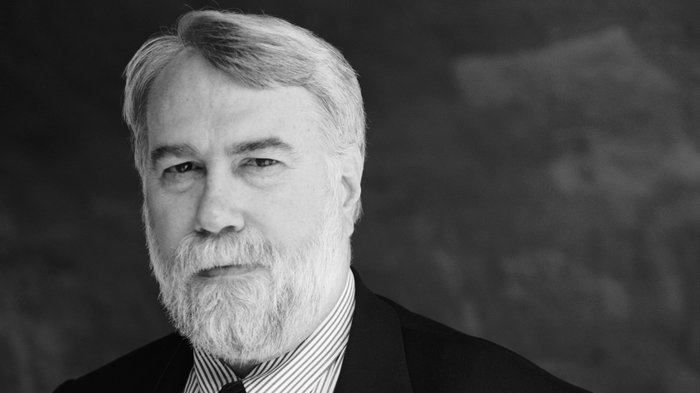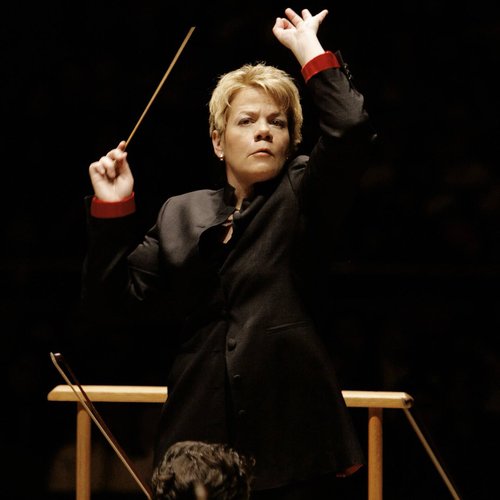New Rouse work proves mesmerizing in the hands of Alsop, Baltimore Symphony

Christopher Rouse’s “Berceuse Infinie” was given its world premiere by Marin Alsop and the Baltimore Symphony Orchestra last weekend. Photo: Jeff Herman
Marin Alsop paired old and new in her program with the Baltimore Symphony Orchestra Sunday afternoon in the Music Center at Strathmore. The concert combined an elegant reading of a world premiere by Christopher Rouse with a beautiful, if intermittently staid rendition of Mozart’s setting of the Requiem Mass.
Rouse, born in Baltimore, has a long association with his hometown band. Among a handful of recent performances, the BSO turned to him last year for what turned out to be the best of ten five-minute works commissioned by the orchestra to celebrate its 100th anniversary. Sunday’s concert opened with another BSO commission, Berceuse Infinie (Infinite Lullaby), a 13-minute tone poem dedicated to Alsop and heard in its world premiere at these concerts.
Rather than a barnstorming concert opener, this meditative piece explores several oscillating motifs put through an array of orchestral colors. The work begins and ends on a unison note, first heard in the back desks of the second violin section, an almost disembodied presence. In what becomes a repeated thematic element, the orchestra collectively exhaled audibly over this backdrop, a sound evoking a maternal sigh, uttered perhaps by the universe.
The interval that begins the rocking motion running through the piece is a minor third, heard first in the strings and then celesta, a sort of natural melodic gesture associated with childhood in nursery songs or the perennial chanted taunt “nyah-nyah.” Rouse stirs other intervals into the mix, and over these rocking motifs melodies appear in the woodwinds. Some of Rouse’s high writing on these solos made ensemble intonation a challenge, but the work provides further evidence of Rouse’s inventive melodic gift, namely to create tunes that sound like the work of no other composer.
Rouse explores more menacing sounds in the sections for brass, dominated by low, growling instruments, the trumpets standing out only later. The orchestration is often curious and unexpected, as in the section for trilling woodwinds girded by timpani rolls. At the end the intervals gradually coalesced back to a unison, and after a final kiss of sound from the glockenspiel, a last cosmic breath enclosed the work in silence.

Marin Alsop
The performance of Mozart’s Requiem in D Minor, as completed by Franz Xaver Süssmayr, stood out mostly for the strength of the choral sections, featuring the University of Maryland Concert Choir. Numbering over 100 singers and expertly drilled by director Edward McClary, this ensemble possesses significant power, which was put to good use in the dramatic “Rex tremendae majestatis” movement.
At the same they also displayed consummate agility and clarity in the melismatic fugue subject of the “Kyrie eleison” movement. Crisp diction brought the Latin text, pronounced in the Roman rather than Germanic way, cleanly forward without being fussy, and the intonation and sectional balance of the ensemble were impeccable.
The quartet of soloists sounded best singing as a group, as in the “Recordare” movement, with some minor disappointments individually. Soprano Alisa Jordheim’s small sound was refined but too pale for the more forceful moments of the score. Bass Michael Dean’s blustery tone was prophetic in the “Tuba mirum” movement, coupled with a similarly powerful sound from principal trombonist Aaron LaVere. Benjamin Butterfield’s lighter tenor was suited to Mozart, although thin at the top, and mezzo-soprano Diana Moore’s more robust sound sometimes threatened to overwhelm her colleagues.
Alsop did her part to keep the orchestra underneath the soloists and choir in volume, putting a dynamic focus on the words, often set so impassionately by Mozart as he raced, unsuccessfully, against his own impending death to try to finish the work. Years after Mozart’s death his sister-in-law Sophie recalled Mozart’s final moments on earth: “The last thing he did was to try to mouth the sound of the timpani in his Requiem — this I remember even now.”
The BSO takes up another choral masterwork this week in Handel’s Messiah 7:30 p.m. Saturday and 3 p.m. Sunday at Meyerhoff Symphony Hall. bsomusic.org; 410-783-8000.







